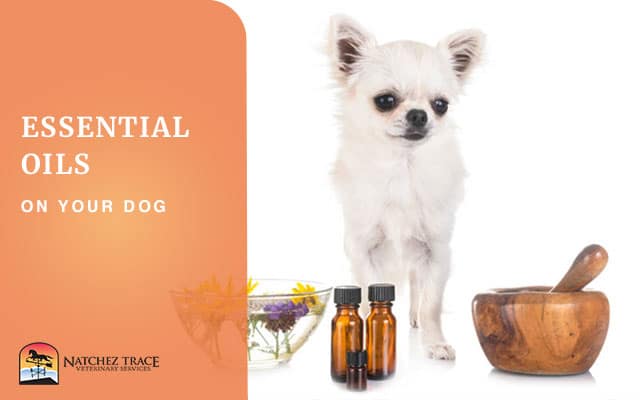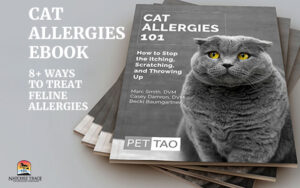Love your dog? Love essential oils? You are going to love this information!
New to essential oils? Well, you’ve come to the right place!
What are Essential Oils?
Essential Oils are the natural, aromatic compounds found in plants.
A plant’s volatile oils (essential oils) are the plant’s main form of protection against predators and the environment.
Essential oils are extracted from the plant by either cold-pressing or steam distilling.
Medicinally, essential oils are potent, safe, and 55-70 times more powerful than herbs!
Unlike pharmaceuticals and chemicals, essential oils don’t cause side effects when used properly.
3 Ways to Use Essential Oils for Dogs
Aromatically
- Add several drops of essential oil to water in a diffuser
- Place several drops on a cotton ball or piece of cloth and place them near your dog
- Benefits:
- Purifies Air
- Manages Moods
- Opens Airways
Topically
- Apply essential oils between the toe pads on your dog’s feet
- Place a couple of drops of essential oil in your hands, rub them together, then pet your dog. (You may need to dilute the essential oil first.)
- Benefits:
- Immediate comfort
- Supports overall health of the area treated
- Systemic health support
- Immune system Support
Important Precautions When Using Topically
- Never use essential oils in your dog’s eyes, nose, or ear canals! Essential oils are best applied to the bottom of back paws between toe pads, on the stomach, and/or behind the ears.
- Use essential oils that are safe for human consumption. If the essential oil is safe for human consumption, a supplement fact (like you would find on a cereal box) will be on the essential oil’s product label. If the oil is unsafe for human consumption, the label will contain a disclaimer such as “For External Use Only.”
Internally
If you want to use essential oils internally, we recommend reading SpOIL Your Pet by Dr. Mia Frezzo.
The book has complete instructions and recipes for common health conditions.
Following the recipes in the book, you’ll ensure you are using the correct oils and amounts.
In addition, make sure the oils you use are a top quality brand and safe for ingestion.
Internal uses and benefits:
- Add a few drops to your dog’s water or food
- Add a few drops to a gelatin capsule and give to your dog
- Benefits:
- Aids digestion
- Oral health support
- Throat comfort and support
- Liver health support
-
- Oregano
- Cassia
- Cinnamon
- Clove
- Rosemary
- Thyme
Standard Dilution Ratios:
- Dogs over 15 lbs: Dilute at one drop of essential oil to 1 tablespoon of fractionated coconut oil
- Dogs under 15 lbs: Dilute one drop of essential oil to 2 tablespoons of fractionated coconut oil
- Young puppies: Dilute at one drop of essential oil to 3 tablespoons of fractionated coconut oil
- Special Needs: Use essential oils with caution and dilute one drop of essential oil to 3 tablespoons of fractionated coconut oil for dogs that are old, pregnant, sick, or prone to seizures.
- Hot Oils: dilute one drop of essential oil to 3 tablespoons of fractionated coconut oil.
Oils to Avoid Using With Dogs Topically and Internally
As a general rule, do not use the following oils topically or internally on your dog, unless specifically instructed in a recipe from your veterinarian or one of the above books.
All doTERRA oils are fine for dogs in the diffuser. And, they are much better than toxic artificial scents!!
The following list of oils to avoid topically and internally is from doTERRA Veterinary Panel member, Dr. Janet Roark, DVM’s website:
-
- Birch: Is high in methyl salicylate, which can be toxic to dogs
- Melaleuca (Tea Tree): Toxicity most often occurs when well-meaning owners apply 100% oil as a parasite control. Marjoram is an excellent oil to use in place of melaleuca. Marjoram is calming, has antispasmodic effects, and is strongly antibacterial.
- Wintergreen: Is high in methyl salicylate, which can be toxic to dogs
The following oils are considered “hot” oils, and should be used with caution and highly diluted:
-
- Oregano
- Cassia
- Cinnamon
- Clove
- Rosemary
- Thyme
Standard Dilution Ratios:
- Dogs over 15 lbs: Dilute at one drop of essential oil to 1 tablespoon of fractionated coconut oil
- Dogs under 15 lbs: Dilute one drop of essential oil to 2 tablespoons of fractionated coconut oil
- Young puppies: Dilute at one drop of essential oil to 3 tablespoons of fractionated coconut oil
- Special Needs: Use essential oils with caution and dilute one drop of essential oil to 3 tablespoons of fractionated coconut oil for dogs that are old, pregnant, sick, or prone to seizures.
- Hot Oils: dilute one drop of essential oil to 3 tablespoons of fractionated coconut oil.







